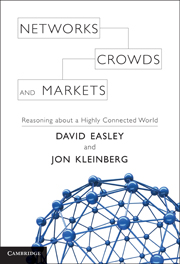Book contents
- Frontmatter
- Contents
- Preface
- 1 Overview
- Part I Graph Theory and Social Networks
- Part II Game Theory
- Part III Markets and Strategic Interaction in Networks
- Part IV Information Networks and the World Wide Web
- Part V Network Dynamics: Population Models
- 16 Information Cascades
- 17 Network Effects
- 18 Power Laws and Rich-Get-Richer Phenomena
- Part VI Network Dynamics: Structural Models
- Part VII Institutions and Aggregate Behavior
- Bibliography
- Index
17 - Network Effects
from Part V - Network Dynamics: Population Models
Published online by Cambridge University Press: 05 June 2012
- Frontmatter
- Contents
- Preface
- 1 Overview
- Part I Graph Theory and Social Networks
- Part II Game Theory
- Part III Markets and Strategic Interaction in Networks
- Part IV Information Networks and the World Wide Web
- Part V Network Dynamics: Population Models
- 16 Information Cascades
- 17 Network Effects
- 18 Power Laws and Rich-Get-Richer Phenomena
- Part VI Network Dynamics: Structural Models
- Part VII Institutions and Aggregate Behavior
- Bibliography
- Index
Summary
At the beginning of Chapter 16, we discussed two fundamentally different reasons why individuals might imitate the behavior of others. One reason was based on informational effects: since the behavior of other people conveys information about what they know, observing this behavior and copying it (even against the evidence of one's own private information) can sometimes be a rational decision. This was our focus in Chapter 16. The other reason was based on direct-benefit effects, also called network effects: for some kinds of decisions, you incur an explicit benefit when you align your behavior with the behavior of others. This is what we will consider in this chapter.
A natural setting where network effects arise is in the adoption of technologies for which interaction or compatibility with others is important. For example, when the fax machine was first introduced as a product, its value to a potential consumer depended on how many others were also using the same technology. The value of a social networking or media-sharing site exhibits the same properties: it's valuable to the extent that other people are using it as well. Similarly, a computer operating system can be more useful if many other people are using it: even if the primary purpose of the operating system itself is not to interact with others, an operating system with more users will tend to have a larger amount of software written for it and will use file formats (e.g., for documents, images, and movies) that more people can easily read.
- Type
- Chapter
- Information
- Networks, Crowds, and MarketsReasoning about a Highly Connected World, pp. 449 - 478Publisher: Cambridge University PressPrint publication year: 2010
- 2
- Cited by



